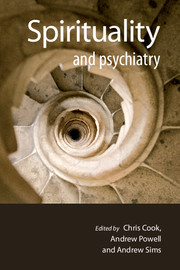Book contents
- Frontmatter
- Contents
- List of contributors
- List of tables, boxes and figures
- Foreword
- Preface
- The Spirituality and Psychiatry Special Interest Group of the Royal College of Psychiatrists
- 1 Spirituality in psychiatry
- 2 Assessing spiritual needs
- 3 Psychosis
- 4 Suicide
- 5 Child and adolescent psychiatry
- 6 Psychotherapy
- 7 Intellectual disability
- 8 Substance misuse
- 9 Neuroscience of the spirit
- 10 Spiritual care in the NHS
- 11 The transpersonal perspective
- 12 Religion and religious experiences
- 13 Pathological spirituality
- 14 Ageing
- Index
3 - Psychosis
Published online by Cambridge University Press: 02 January 2018
- Frontmatter
- Contents
- List of contributors
- List of tables, boxes and figures
- Foreword
- Preface
- The Spirituality and Psychiatry Special Interest Group of the Royal College of Psychiatrists
- 1 Spirituality in psychiatry
- 2 Assessing spiritual needs
- 3 Psychosis
- 4 Suicide
- 5 Child and adolescent psychiatry
- 6 Psychotherapy
- 7 Intellectual disability
- 8 Substance misuse
- 9 Neuroscience of the spirit
- 10 Spiritual care in the NHS
- 11 The transpersonal perspective
- 12 Religion and religious experiences
- 13 Pathological spirituality
- 14 Ageing
- Index
Summary
My mind fills me.
The Madwoman of Cork, Patrick Galvin (1996)Both spirituality and psychosis stretch reason to its limits. They share a sense of mystery and each is notoriously difficult to define. Yet, although psychosis lies at the heart of psychiatry, psychiatrists have often dismissed or regarded with distrust spirituality that is valued by many of their patients. Every psychiatrist practising in general adult, forensic or rehabilitation specialties will be familiar with the daily struggle to make sense of, and progress with, people who have psychosis and to support their personal journeys towards recovery. We will consider how spiritual perspectives may be relevant to this clinical work.
Models of health, disease and recovery
Psychiatry as a medical discipline is sometimes pejoratively regarded as ‘hostage’ to a medical model that regards all illnesses as somatic, caused at some level by bodily malfunction and giving pre-eminence to biological and drug remedies. In trying to understand the relationship between spirituality and psychosis, such categorical explanatory models can be misleading as they tend either to ignore the spiritual or to see it as an addition to other aspects. Although a more balanced and holistic bio-psychosocial approach has evolved, this may still leave little place for the spirit and indeed can itself be hard to uphold. ‘We have allowed the bio-psychosocial model to become the bio-bio-bio model’ (Sharfstein, 2005).
Cullberg (2006) argues cogently that a humanistic view is compatible with a biological approach and there is now an increasing understanding of trauma, environment and social isolation – things that may adversely affect the spirit – as playing part both in the aetiology and management of psychosis (Read et al, 2004; Cullberg, 2006). In the UK, a number of agencies, the National Institute for Mental Health (2003), Rethink (2005), the Mental Health Foundation (2006), the user movement and a vanguard of mental health professionals with personal experience of psychosis have all contributed to raising awareness of spiritual issues in psychosis. Spirituality is also important within the growing international recovery movement (Care Services Improvement Partnership et al, 2007; Lukoff, 2007b); this includes the New Zealand Mental Health Commission's recognition that in Maori culture spirituality is considered the most essential requirement for health, and the incorporation of a holistic assessment which includes spirituality in the clinical practice of Maori services (the Te Whare Tapa Wha model, Durie, 2001).
- Type
- Chapter
- Information
- Spirituality and Psychiatry , pp. 39 - 60Publisher: Royal College of PsychiatristsPrint publication year: 2009

